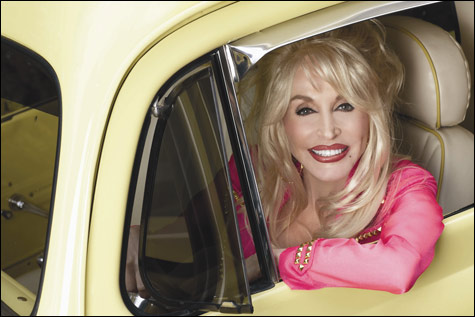
GLORY OR BUST: Those major labels who counted Dolly as a has-been are the ones in a bind. |
Dolly Parton should run for president.
She’s qualified. For 22 years, Parton has led a vast community based on family values and cultural traditions. It’s called Dollywood, and it has far better thrill rides than most American cities. Plus, the country-music icon already has her own campaign bus, and it’ll pull into Boston on Tuesday, when Parton and her big band play the Opera House behind her new Backwoods Barbie (Dolly Records).
And Parton is an inspirational speaker. “I’ll never stop doing and I’ll never stop dreaming,” she says when we connect by phone as her bus rolls through the desert outside Las Vegas. “And I believe in putting shoes on my dreams, so if they can’t fly, they can walk.”
Dolly also knows business. In 1974, she refused to sign half the rights to her song “I Will Always Love You” over to Elvis Presley’s manager, Colonel Tom Parker — a requirement for any tune to be cut by the King. According to the Country Music Hall of Fame and Museum, the megahit has generated more than $250 million.
“I knew it was one of my best songs,” she says, “but it wouldn’t have mattered what song Parker wanted the publishing on. That’s money I’m earning for my family. I couldn’t give it up. It was already a hit for me, but then after Whitney Houston recorded it and I did it two more times, once with Vince Gill, well . . . I’ve made gobs of money off it.”
Vast riches aside, there are many reasons why Dolly should shoot for the Oval Office. She proved she was in touch with the working class with the 1980 movie and #1 smash 9 to 5. And though she might not look presidential in her mini-skirted Pocahontas get-up or the leopard-print V-scoop one-piece she wears on the cover of her new disc, the media and the public both love an underdog.
Dolly Rebecca Parton was born that way, the fourth of 12 children in a family homesteading a one-room cabin in Locust Ridge, Tennessee. She moved to Nashville in 1964 to seek her fortune, and she found it. Then, two decades ago, when country-radio programmers and label chiefs decided it was time for a new rock-fangled brand of the music, she and a host of other classic artists — including Johnny Cash, Loretta Lynn, and George Jones — were dismissed from the industry. It’s not exactly a rag-to-riches-to-rags story, but in the pop superstar realm, she became an underdog again.
Today, thanks to Backwoods Barbie, Dolly’s enjoying the last howl.
It’s not as if the irrepressibly perky 62-year-old had slipped off the radar. Parton’s torch stayed fueled by her iconic status among gays, hipsters, and unironic fans, plus a series of spellbinding acoustic back-to-her-roots mountain-music albums, like 2001’s Grammy-nominated Little Sparrow and 2002’s Halos & Horns (both on Sugar Hill).
But Backwoods Barbie didn’t simply nestle into the charts. Her first shot at reaching a mainstream audience in 17 years landed with an arrow-like “thunk” at #17 on the Billboard Top 200 pop albums and at #2 on both the indie and country charts. And Parton is relishing the triumph, with maybe just a little taste of revenge.
“I decided to start my own label and invest in myself and just go for it,” she says. “I figured if it went well, I’d make all the money. If it didn’t, well, I’ve made a lot of other very good business investments, so I could afford to spend the money on me. As it turns out, it’s one of the most successful albums of my career so far, and the major labels that ignored me are all going down the tubes. They’re all has-beens like they thought I was.”
What’s truly amazing about Backwoods Barbie is that it manages to pander to every element of Parton’s fan base without sounding insincere or compromised. And that, says the musical uniter-not-divider, was exactly the plan. “I recorded 23 songs to find just the right blend.”
Parton sings all dozen keepers like a champ. Her vocalizing is as clear-toned and powerful as it was in the ’70s, when hits like “Coat of Many Colors” and “Jolene” delivered her first crossover successes. Her voice, with its high range and distinctively quivering vibrato, remains one of the most unmistakable instruments in American popular music, like Coleman Hawkins’s sax or Frank Sinatra’s swaggering baritone. And her accompanists are a mix of studio aces and band members who have backed her for 20 years.
Backwoods Barbie flits by, dashing from pop to rock to honky-tonk to lounge blues to hard country. The title track is autobiographical — a play on her sweet-tart persona. “I’m just a backwoods Barbie,” she sings, “too much make-up, too much hair/But don’t be fooled by thinkin’/That the goods are not all there.”